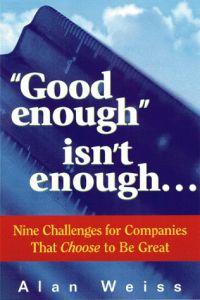Join getAbstract to access the summary!

Join getAbstract to access the summary!
Alan Weiss
Good Enough Isn't Enough
Nine Challenges for Companies That Choose to Be Great
AMACOM, 2000
What's inside?
It’s not easy being better than good, but it sure is profitable.
Recommendation
Alan Weiss’s clarion call for corporate excellence may remind you of your parents’ stern guidance in your youth. You weren’t sure you wanted to listen to their traditional viewpoints, but you knew they were right. Weiss cites today’s watered-down sense of social accountability as the bad seed that has spoiled corporate standards. He insists that constantly lowering standards is not the way to achieve lasting excellence. He warns that executives need to exercise common sense rather than chase every management fad they encounter or succumb to high-priced consultants. Similarly, he warns that executives who surround themselves with sycophants will get carried away with their own egos. At times, Weiss seems to get a bit carried away himself, regaling how he browbeat the service rep when his bottled water delivery went to the wrong address. But getAbstract recommends this book as beneficial to executives - and even to consultants - as a refreshing throwback to days before the advent of kinder, gentler management.
Summary
About the Author
Alan Weiss, Ph.D. is president of Summit Consulting Group. A regular on the consulting speakers’ circuit, Weiss has written more than 400 articles and 10 books, including Money Talks and Our Emperors Have No Clothes.




















Comment on this summary